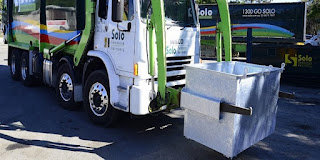What is a Resource Recovery Centre and How Important is it for Every Society?
Resource recovery, also known as Adelaide rubbish removal, is the process of recovering hazardous and non-hazardous waste and converting it into reusable energy. The goal here is to make good use of the waste materials' environmental, social, and economic costs before they are permanently landfilled.
How does resource recovery play an important role?
The goal of resource
recovery or hazardous waste disposal Adelaide service is to divert end-of-life materials and useful waste away
from landfills and into the production of valuable outputs or products.
What is the fundamental distinction between resource recovery and
recycling?
The recovery of substances
from waste is part of the resource recovery process, whereas recycling is a
recovery operation in which waste materials are reprocessed into substances,
materials, or products for the original or other related purposes.
What kinds of materials can be recovered?
Metals, cardboard, asphalt
shingles, concrete, sheetrock, lumber, clean fill, and other potentially
recoverable materials include electrical wire, wood waste, glass, organics,
plastics, and the like.
How does a resource recovery facility help society?
Apart from mitigating
waste going to be landfilled, a resource recovery centre ensures the following
benefits, too:
Environmental
Benefits
·
A Resource recovery centre helps minimise:
·
Dust, noise, odour and litter;
·
Groundwater and surface contamination;
·
Effects on flora and fauna; and
·
Greenhouse gas emissions
Economic Benefits
·
Generate profits from the production of
compost and/or energy
·
Minimise the effects of growing landfill
costs and the landfill levy.
Social Benefits
·
Mitigate community effect of waste management
on our environment
·
Build a community-wide interest and awareness
in the significance of sustainable waste management
How Are Recyclables Processed?
When we see green and blue
plastic cans on the streets filled with trash, we become curious about the fate
of the contents inside. Most of us have no idea how or where the contents of
that crushed can end up.
Once collected,
recyclables are taken to a recovery centre where they are sorted, cleaned,
and processed into usable materials for manufacturing. Recyclables are traded
in the same way that raw materials are, and their prices frequently fluctuate
due to supply and demand among manufacturers.
The recycling steps include:
·
Collecting the recyclables
·
Processing the recyclables to eventually turn
them into recycled-content products
·
Trading those recycled products
However, with the advent
of a staggering number of resource recycling facilities, both the collection
and processing of recyclables have been made easier and more streamlined with
the assistance of advanced technologies and equipment. While this may appear to
be a daunting concept, the entire process can actually be broken down into
three primary steps.
Recyclables are collected
In terms of how
recyclables are collected, every city, community, and society is a little
different; however, the majority of them have an obligatory recycling law that
requires collection and centre operation. To learn about the specific recycling
guidelines, one must look into their respective city's recycling laws. It is
not possible to recycle everything. The types of recyclables vary depending on
the laws and regulations of each city. It is critical to understand which
containers are recyclable and which are not.
Recyclables are brought to the centre and sorted
When recyclables are
brought to a facility such as the Adelaide Waste and Recycling Centre (AWRC),
the content is sorted by type, such as plastics, cans, newspapers, and so on.
Workers assist in sorting clean recyclables from soiled recyclables into
separate piles. While some recycling facilities disregard the importance of
washing recyclables, AWRC believes that 'the cleaner the better,' because
manufacturers will pay more for clean containers. AWRC never throws away a container
and has systems in place to clean them.
Buyers buy the recycled items
Recyclables are
essentially regarded as commodities. After they have been sorted, manufacturers
come to the facility to price the sorted recycled items. Following that, the recyclables
are processed and broken down into raw materials, which are then transformed
into new products. Plastics with the numbers 1, 2, 3, 4, and 5 are the most
sought-after by manufacturers.
Every household and
business can have their computers and television sets recycled for free at
their local resource recycling centre. The AWRC provides Adelaide rubbish removal and recycling services to both residential
and commercial clients. The Adelaide Waste and Recycling Centre is a
cutting-edge resource recovery facility and waste recycling operation that has
been collecting, sorting, and recycling a diverse range of waste materials for
many years. Solo Resource Recovery manages both their commercial services and
the waste transfer station. They accept the following types, but not limited,
of commercial and domestic wastes:
·
General waste
·
Paper and cardboard waste
·
Construction & demolition waste
·
Green waste
·
Residual waste items including gas bottles
·
Paint
·
Motor oil, vegetable oil
·
Tyres
·
Clean soil
·
Mattresses
·
Hazardous waste
Over the years, the AWRC has been fine-tuned
to perfection. The types of waste or rubbish are constantly changing, as are
the technologies, equipment, and approaches used to deal with them. The AWRC
stands out as a modern Resource Recycling Centre in Adelaide, from ensuring a
streamlined recycling process to offering ideal prices to manufacturers.







Comments
Post a Comment